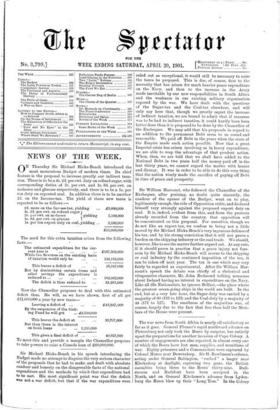Sir William Harcourt, who followed the Chancellor of the Exchequer,
after praising, no doubt quite sincerely, the candour of the opener of the Budget, went on to play, legitimately enough, the role of Opposition critic, and declared himself very strongly against the proposed export duty on coal. It is, indeed, evident from this, and from the protests already recorded from the country, that opposition will be concentrated on this proposal. For ourselves, though we do not like an export tax, we confess to being not a little moved by Sir Michael Hicks-Beach's very ingenious defence of his tax, and by his strong conviction that it will not prove a burden on the shipping industry or the coal trade. We should, however, like to see the matter further argued out. At any rate, if it should prove in practice that a grave injury not fore- seen by Sir Michael Hicks-Beach will accrue to the shipping or coal industry by the continued imposition of the tax, it can be taken off next year. The tax is one which may very fairly be regarded as experimental. After Sir William Har- court's speech the debate was chiefly of a rhetorical and vituperative character, Mr. John Redmond talking nonsense about Ireland having no interest in expenditure on the Navy. Like all the Nationalists, he ignores Belfast.—the place where the greatest ocean-going ships in the world are built. In the end, but at a very late hour, the Sugar-duty was carried by a majority of 60 (183 to 123) and the Coal-duty by a majority of 44 (171 to 127). The smallness of the majorities was, of course, largely due to the fact that less than half the Mem- bers of the House were present.






































